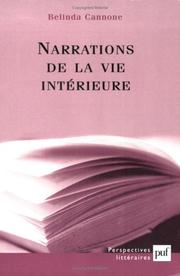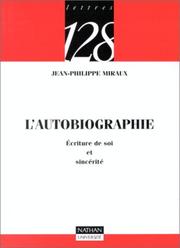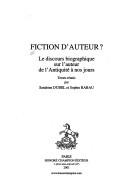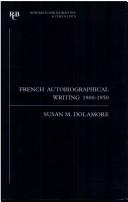| Listing 1 - 10 of 19 | << page >> |
Sort by
|
Book
ISBN: 9782706819131 2706819138 Year: 2005 Publisher: Paris: Maisonneuve et Larose,
Abstract | Keywords | Export | Availability | Bookmark
 Loading...
Loading...Choose an application
- Reference Manager
- EndNote
- RefWorks (Direct export to RefWorks)
Chinese literature --- Self in literature --- Littérature chinoise --- Moi (Psychologie) dans la littérature

ISBN: 2130522645 9782130522645 Year: 2001 Publisher: Paris: PUF,
Abstract | Keywords | Export | Availability | Bookmark
 Loading...
Loading...Choose an application
- Reference Manager
- EndNote
- RefWorks (Direct export to RefWorks)
Litterature --- Narration --- Monologue interieur --- Moi (Psychologie) dans la litterature --- Roman --- Discours narratif
Book
ISBN: 2912567327 9782912567321 Year: 2001 Publisher: Nantes: Pleins feux,
Abstract | Keywords | Export | Availability | Bookmark
 Loading...
Loading...Choose an application
- Reference Manager
- EndNote
- RefWorks (Direct export to RefWorks)
Fiction --- Comparative literature --- French literature --- Roman francais --- Roman --- Moi (Psychologie) dans la litterature --- Identite (Psychologie) dans la litterature --- Narration --- Themes, motifs --- Aspect psychologique --- Roman francais - 20e siecle - Themes, motifs --- Roman - 20e siecle - Themes, motifs --- Narration - Aspect psychologique
Book

ISBN: 2753507651 9782753507654 2753546819 9782753546813 Year: 2016 Publisher: Rennes : Presses universitaires de Rennes,
Abstract | Keywords | Export | Availability | Bookmark
 Loading...
Loading...Choose an application
- Reference Manager
- EndNote
- RefWorks (Direct export to RefWorks)
« Le but de l’écriture, c’est de porter la vie à l’état d’une puissance non personnelle », nous dit Gilles Deleuze. En définissant ainsi la littérature, Deleuze nous demande de ne plus la penser en termes thématiques, ni même génériques, mais plutôt en termes d’activité et de créativité. De sa définition, entre esthétique et esquisse d’une théorie de la réception, de « l’impersonnel » du texte littéraire comme « flux qui conjugue avec d’autres flux », naissent de nombreuses questions : l’impersonnel peut-il nous aider à mieux penser le texte et, inversement, aider le texte à se penser soi-même ? Comment le texte et l’écriture amènent-ils l’écrivain à dépasser le seuil de sa propre vie, son propre contexte, sa propre histoire pour toucher quelque chose en dehors de la vie ? Qu’arrive-t-il au lecteur d’un tel texte ? Qu’advient-il dans cette rencontre entre lecteur et texte impersonnel ? Ouvert à toutes les littératures d’Europe et d’Amérique, cet ouvrage est la réponse de chercheurs, de philosophes et de poètes à cette notion problématique. Par-delà la définition deleuzienne, il s’agit d’établir un dialogue entre l’impersonnel et les concepts connexes d’impersonnalité, de dépersonnalisation et de voix collective en littérature. Pour que l’impersonnel ne soit pas simplement le négatif d’une personnalisation valorisée.
Self in literature. --- Comparative literature --- Literature, Modern --- Identity (Psychology) in literature. --- Moi (Psychologie) dans la littérature. --- Identité (Psychologie) dans la littérature. --- Littérature comparée --- History and criticism. --- Thèmes, motifs. --- Literature (General) --- littérature --- psychologie --- Moi --- point de vue --- esthétique

ISBN: 2091903701 9782091903705 Year: 1996 Volume: 149 Publisher: Paris: Fernand Nathan,
Abstract | Keywords | Export | Availability | Bookmark
 Loading...
Loading...Choose an application
- Reference Manager
- EndNote
- RefWorks (Direct export to RefWorks)
82-94 --- 82-94 Dagboek. Memoires. Autobiografie --- Dagboek. Memoires. Autobiografie --- Autobiographie dans la littérature --- Moi (Psychologie) dans la litterature --- Autobiography in literature --- Autobiography --- French literature --- Diaries --- History and criticism --- Diaries - History and criticism
Book
ISBN: 1779272642 9781779272645 1779255780 9781779255785 Year: 2021 Publisher: Oxford : Mwanaka Media and Publishing Pvt Limited,
Abstract | Keywords | Export | Availability | Bookmark
 Loading...
Loading...Choose an application
- Reference Manager
- EndNote
- RefWorks (Direct export to RefWorks)
Moi (Psychologie) dans la litterature. --- Maladies mentales dans la litterature. --- Alterite dans la litterature. --- Roman africain --- Self in literature. --- Mental illness in literature. --- Difference (Psychology) in literature. --- Other (Philosophy) in literature. --- African fiction --- Histoire et critique. --- History and criticism.

ISBN: 274530366X 9782745303660 Year: 2001 Volume: 4 Publisher: Paris: Droz,
Abstract | Keywords | Export | Availability | Bookmark
 Loading...
Loading...Choose an application
- Reference Manager
- EndNote
- RefWorks (Direct export to RefWorks)
Comparative literature --- Thematology --- Biographie (Genre littéraire) --- Ecrivains --- Ecrivains dans la littérature --- Moi (Psychologie) dans la littérature --- Histoire et critique --- 82-94 --- 875-94 --- 871-94 --- Dagboek. Memoires. Autobiografie --- Griekse literatuur: dagboek; memoires --- 875-94 Griekse literatuur: dagboek; memoires --- 82-94 Dagboek. Memoires. Autobiografie --- Biographie (Genre littéraire) - Congrès --- Ecrivains - Biographies - Histoire et critique - Congrès --- Ecrivains dans la littérature - Congrès --- Moi (Psychologie) dans la littérature - Congrès --- Auteur (esthétique) --- Authors --- Authors. --- Biografieën. --- Biographes --- Biographie (genre littéraire). --- Biography as a literary form. --- Moi --- Schrijvers. --- Écrivains dans la littérature --- Écrivains --- Dans la littérature. --- Histoire. --- Congrès. --- Biographies --- Histoire et critique.

ISBN: 0729303969 9780729303965 Year: 1997 Volume: 52 Publisher: London: Grant and Cutler,
Abstract | Keywords | Export | Availability | Bookmark
 Loading...
Loading...Choose an application
- Reference Manager
- EndNote
- RefWorks (Direct export to RefWorks)
Autobiography --- Authors, French --- Autobiographie --- Ecrivains français --- Bibliography. --- Biography --- Bibliography --- Bibliographie --- Biographie --- Ecrivains français --- Authors, French. --- Autobiografieën. --- Autobiographies --- Autobiography. --- French literature --- Littérature française --- Moi (Psychologie) dans la littérature --- Self in literature --- Self in literature. --- Écrivains français --- Sources --- History and criticism --- Histoire et critique --- Biographies --- 1900-1999. --- Frans.
Book
ISBN: 0228001706 9780228001706 0228003059 Year: 2020 Publisher: Montreal : McGill-Queen's University Press,
Abstract | Keywords | Export | Availability | Bookmark
 Loading...
Loading...Choose an application
- Reference Manager
- EndNote
- RefWorks (Direct export to RefWorks)
This book aims to expand our sense of poetry's reach and potential impact. It is an effort at recouping the poetic imperative buried within the first taxonomic description of human being: "nosce te ipsum," or "know yourself." Johanna Skibsrud explores both poetry and human being not as fixed categories but as active processes of self-reflection and considers the way that human being is constantly activated within and through language and thinking. By examining a range of modern and contemporary poets including Wallace Stevens, M. NourbeSe Philip, and Anne Carson, all with an interest in playfully disrupting sense and logic and eliciting unexpected connections, The Poetic Imperative highlights the relationship between the practice of writing and reading and a broad tradition of speculative thought. It also seeks to demonstrate that the imperative "know yourself" functions not only as a command to speak and listen, but also as a call to action and feeling. The book argues that poetic modes of knowing - though central to poetry understood as a genre - are also at the root of any conscious effort to move beyond the subjective limits of language and selfhood in the hopes of touching upon the unknown. Engaging and erudite, The Poetic Imperative is an invitation to direct our attention simultaneously to the finite and embodied limits of selfhood, as well as to what those limits touch: the infinite, the Other, and truth itself.
82-1 --- Poetry, Modern --- Poetics --- Self in literature --- 82-1 Poëzie. Gedichten. Versvorm --- Poëzie. Gedichten. Versvorm --- 82-1 Poetry. Poems. Verse --- Poetry. Poems. Verse --- Poetry --- History and criticism --- Technique --- Moi (Psychologie) dans la littérature. --- Poetics. --- Poetry, Modern. --- Poésie --- Poétique. --- Self in literature. --- History and criticism. --- Histoire et critique
Book
ISBN: 9781487543778 9781487543556 Year: 2022 Publisher: Toronto University of Toronto Press
Abstract | Keywords | Export | Availability | Bookmark
 Loading...
Loading...Choose an application
- Reference Manager
- EndNote
- RefWorks (Direct export to RefWorks)
"Altered states of consciousness--including experiences of deprivation, pain, hallucination, fear, desire, alienation, and spiritual transcendence--can transform the ordinary experience of selfhood. Unselfing explores the nature of disruptive self-experiences and the different shapes they have taken in literary writing. The book focuses on the tension between rival conceptions of unselfing as either a form of productive self-transcendence or a form of alienating self-loss. Michaela Hulstyn explores the shapes and meanings of unselfing through the framework of the global French literary world, encompassing texts by modernist figures in France and Belgium alongside writers from Algeria, Rwanda, and Morocco. Together, these diverse texts prompt a re-evaluation of the consequences of the loss or the transcendence of the self. Through a series of close readings, Hulstyn offers a new account of the ethical questions raised by altered states and shows how philosophies of empathy can be tested against and often challenged by literary works. Drawing on cognitive science and phenomenology, Unselfing provides a new methodology for approaching texts that give shape to the fringes of conscious experience."--
États modifies de conscience dans la litterature. --- Moi (Psychologie) dans la litterature. --- Litterature française --- Altered states of consciousness in literature. --- Self in literature. --- French literature --- Histoire et critique. --- History and criticism. --- Abdelkebir Khatibi. --- Charlotte Delbo. --- Francophone. --- French literature. --- Georges Bataille. --- Henri Michaux. --- Hélène Cixous. --- Paul Valéry. --- Simone Weil. --- Yolande Mukagasana. --- autobiography. --- phenomenology. --- self. --- unselfing. --- Self in literature --- History and criticism
| Listing 1 - 10 of 19 | << page >> |
Sort by
|

 Search
Search Feedback
Feedback About UniCat
About UniCat  Help
Help News
News